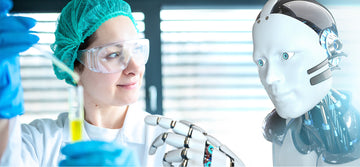Can AI Replace the Human Creative Mind When Formulating Cosmetic Products?
Artificial intelligence (AI) has made remarkable strides in various fields, revolutionizing industries, and transforming the way we work. The beauty and cosmetics industry is no exception, with AI being utilized in product development, marketing, and even virtual try-on experiences. However, the question remains: Can AI truly replace the human creative mind when it comes to formulating cosmetic products? In this article, we will explore the current capabilities of AI in cosmetic formulation, its limitations, and the irreplaceable role of human creativity in the process.
Understanding AI in Cosmetic Formulation
AI is a branch of computer science that enables machines to perform tasks that typically require human intelligence. In the context of cosmetic formulation, AI can analyse vast amounts of data, identify patterns, and generate formulations based on predetermined algorithms and objectives. It can streamline the process by quickly analysing ingredient interactions, predicting product stability, and even recommending formulation adjustments.
Benefits of AI in Cosmetic Formulation
- Efficiency and Speed: AI can process and analyse vast amounts of data in a fraction of the time it would take a human formulator. This enables rapid formulation development, reducing the time-to-market for new products.
- Data-Driven Insights: AI algorithms can uncover correlations and trends within large datasets, helping formulators make more informed decisions. By considering consumer preferences, ingredient interactions, and regulatory requirements, AI can assist in creating products that align with market demands.
- Cost Reduction: AI-driven formulation can optimize ingredient usage, reduce trial and error, and minimize wastage, resulting in cost savings for cosmetic companies.
- Customization and Personalization: With the help of AI, cosmetic companies can create personalized products tailored to individual consumer needs. AI can analyse consumer data, such as skin type, concerns, and preferences, to develop custom formulations that cater to specific requirements.
- Sustainability and Eco-friendliness: AI can help identify eco-friendly and sustainable ingredients, as well as optimize formulations to minimize environmental impact. This contributes to the development of greener cosmetic products that meet the growing demand for sustainable beauty options.

Limitations of AI in Cosmetic Formulation
- Lack of Creativity: While AI can generate formulations based on existing data, it lacks the human touch and creativity that is essential in developing innovative and unique cosmetic products. AI algorithms rely on existing information and cannot generate entirely novel ideas or breakthrough innovations.
- Intuitive Decision-making: Formulating cosmetics requires intuition and subjective judgment, which is challenging for AI algorithms to replicate. Human formulators can consider factors such as sensory experience, aesthetics, and cultural nuances that play a significant role in creating successful products.
- Contextual Understanding: AI struggles with understanding and interpreting the subtleties of human experiences and preferences. It cannot fully grasp the emotional connection that consumers have with beauty products, making it challenging to replicate the sensory aspects that contribute to customer satisfaction.
The Role of Human Creativity in Cosmetic Formulation
- Intuition and Artistry: Human formulators bring a unique blend of intuition, artistry, and experience to the formulation process. They can perceive nuances, adapt to unexpected challenges, and leverage their creativity to develop groundbreaking products.
- Emotional Connection: Humans possess the ability to understand and empathize with consumers, enabling them to create products that resonate on an emotional level. Beauty products often evoke specific feelings, and human formulators can tap into these nuances to create an exceptional sensory experience.
- Flexibility and Adaptability: Cosmetic formulation is an iterative and dynamic process. Human formulators have the ability to adapt, improvise, and refine formulations based on real-time feedback, market trends, and emerging consumer needs.
- Collaboration and Teamwork: The cosmetic formulation process often involves collaboration between various professionals, such as chemists, marketers, and designers. Human formulators can work together, share ideas, and combine their unique skill sets to create innovative cosmetic products that stand out in the market.
The Synergy of AI and Human Creativity
While AI alone cannot fully replace the human creative mind in cosmetic formulation, it can be a powerful tool to augment human capabilities. By leveraging the strengths of AI, such as data analysis and efficiency, and combining them with the human touch, cosmetic formulators can achieve optimal results.
AI has undoubtedly brought significant advancements to the cosmetic formulation process, enabling faster analysis, data-driven insights, and cost reductions. However, the human creative mind remains indispensable in the formulation of cosmetic products. The ability to think outside the box, perceive subtleties, and create products that resonate emotionally with consumers cannot be replicated by AI algorithms alone. By embracing the synergy between AI and human creativity, the beauty industry can harness the full potential of technology while continuing to deliver innovative, exciting, and personalized cosmetic products.




